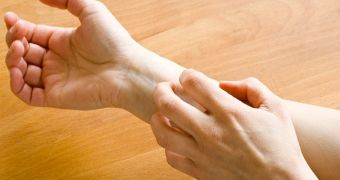We humans have been getting itches in the oddest of places since, well, since forever. Who says that those stone spears our ancestors made were meant for hunting? Maybe they were just some really primitive back scratchers.
Anyway, the point is that, although itches have been our companions (or, better said, our nemesis) all throughout history, it was only recently that scientists have finally figured out why scratching an itch makes it worse.
The investigation was carried out by specialists with the Washington University School of Medicine in St. Louis, US, and its findings are detailed in a paper published in the scientific journal Neuron.
The ins and outs of scratching an itch
As shown by previous investigations, scratching relieves itch sensations by causing people to experience a mild amount of pain in the skin. It is this pain that overrides an itch sensation and makes people feel better.
The problem is that, according to researcher Zhou-Feng Chen and colleagues, this relief that the pain caused by scratching offers is only temporary. Eventually, scratching makes itch sensations way worse than they normally would be.
In their paper in the journal Neuron, the Washington University School of Medicine explains that this is because the pain caused by scratching triggers the brain to release a compound dubbed serotonin. This compound acts on nerve cells, essentially intensifying itch sensations.
“Scratching can relieve itch by creating minor pain. But when the body responds to pain signals, that response actually can make itching worse,” researcher Zhou-Feng Chen explained in a statement.
“As serotonin spreads from the brain into the spinal cord, we found the chemical can ‘jump the tracks,’ moving from pain-sensing neurons to nerve cells that influence itch intensity,” the scientist went on to explain.
To confirm that the serotonin released after scratching is what makes itching sensations worse, Zhou-Feng Chen and fellow researchers carried out a series of experiments on mice.
More precisely, they induced itching in several perfectly normal rodents and in mice whose genetic makeup did not include the genes needed to produce serotonin. When exposed to compounds designed to induce itching, the rodents in the second group scratched less than their mates.
It was only after the genetically engineered mice were injected with serotonin that they got busy scratching like there were no tomorrow, the Washington University School of Medicine specialists write in the journal Neuron.
The importance of this study
Scientist Zhou-Feng Chen and colleagues expect that their findings could one day help treat people forced to live with chronic itching. The idea is to find a way to keep serotonin from interfering with the mechanisms that cause itching sensations.
The scientists say that, since serotonin regulates mood and is also involved in growth, bone metabolism and even aging, simply blocking it altogether could cause more problems than it might potentially solve.
The researchers plan to continue carrying out experiments on laboratory mice and hope that they will soon gain a better understanding of the itch-pain-itch cycle. Once they pin down the exact underlying mechanisms, they might be able to break the pattern.

 14 DAY TRIAL //
14 DAY TRIAL //